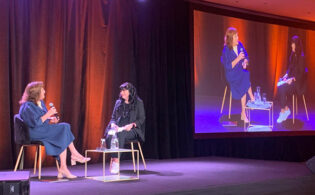Paulo Koelle, director of Prime Video Latin America, who received the Premio Ícono TV Latina 2024 in partnership with MIP CANCUN, discussed the milestones of the service in the region and its multifaceted business strategy during his keynote today in a conversation with Elizabeth Bowen-Tombari, editor of TV Latina.
“Our team is responsible for all the content we integrate and program on the service in Latin America,” Koelle began the conversation. “Then there’s the work we do for growth and investment plans for the future, which involves third-party content and relationships with our partners, among other things.”
He added: “But what we are really obsessed with is what we do for the customer. This means that every time they open the app, they’ll find something fun they would like to watch.”
Bowen-Tombari asked about the lessons and experiences learned during recent years. “When you look at Prime Video, it’s true that it reached several milestones and faced many challenges during that time,” said Koelle. “I’m very proud of what the team accomplished during the pandemic, despite the team being small in 2020. We realized we had a responsibility. People were at home, schools were closed, and they needed something to stay safe and sane at home. We figured out how to launch Prime Video across Latin America within six months in 2020. It was a time that required a lot of work.”
The conversation then turned to the arrival of Prime Video in Latin America, when other streaming services were already in place, and the strategies they considered for entering the region. “There were many streaming services that had arrived, but not many were well established,” Koelle explained. “I think the timing was very important, because launching a new streaming brand from a company that is not historically known as a studio, in today’s saturated media landscape, would have been much harder. It was beneficial that Prime Video was one of the first to arrive, particularly with a lot of regional and global content.”
Koelle noted that having a variety of content helped differentiate the service. “Then we had to keep growing and staying on this path. At Amazon, we say that it’s always Day One, and we are characterized by this. We’re never done. This has been part of Prime Video’s DNA.”
Bowen-Tombari emphasized that Latin America is a priority territory for media companies and asked Koelle if this was the case for Prime Video. “Latin America is already important, but the potential it holds is the most exciting part,” Koelle said. “Today, the business is really developed in Brazil, Mexico, Argentina, Chile and Colombia. We have local original productions for all these countries. We also have live sports in Mexico and Brazil, and next year, we will have live NBA sports.”
He also mentioned Betty la fea, la historia continúa, which was “the most-watched original series in Latin America on Prime Video globally. People have really enjoyed watching this Colombian show. It’s an IP we’re very proud of.”
Talking particularly about the Mexican and Brazilian markets, Koelle commented: “They are important, and Amazon has a presence with core business units in these countries. So it’s not just Prime Video but also Amazon Music and our retail business. We announced we are going to invest $300 million in Mexico, and we have plans for more. In Brazil, we recently announced that we have the rights to Serie A to stream an exclusive match per week for 38 weeks of the year. So we’re very excited about what we’re going to offer our customers.”
The importance of original content was a focus of the conversation, with Bowen-Tombari highlighting that streaming services are seeking to have an increasingly robust offering of original content to stand out in the market.
“Our content offering is made up of many things, including titles from Amazon Studios globally,” Koelle said. “We also have licenses from big partners in Latin America, and this creates a solid foundation for the service. But the real differentiation, and what gets people talking, are the original productions, especially the local original content. It’s these offerings that truly set us apart. We want to surprise people with what we’re doing in Latin America.”
Koelle mentioned Cada minuto cuenta from Mexico as one of the productions they are particularly excited about. The series, based on real events, tells the story of the 8.1 magnitude earthquake that struck Mexico City on September 19, 1985, causing one of the country’s largest catastrophes. The production is a tribute to the people who lived through the disaster and to the heroes who fought to keep the tragedy at bay, making every minute count in their rescue efforts.
“This project represented a great investment, but it was also a major achievement from a technical perspective,” he highlighted. “It was the first time we brought a virtual production studio to Latin America. We were able to replicate 13 locations in Mexico City in order to present the moments that occurred as faithfully as possible.”
The conversation turned to the work the company does with its partners, including creators and talent. “We’ve realized that having partners and alliances is the way forward,” explained Koelle. “There’s a great deal of talent, and no streaming service has it all. Partnerships offer different models, and we try to be as flexible as possible.”
He highlighted, “We have a multifaceted partnership with Globo, licensing their content, but we also distribute their channels on Prime Video. The same goes for Paramount, for whom we distribute Paramount+, but we’ve also developed co-productions with them. So the ways of working with Prime Video are very diverse.”
Koelle elaborated on Prime Video Direct, a service where “professional content providers and licensors can showcase their offerings within Prime Video. So, there are many ways we can work and interact. We’re open to working with everyone.”
Bowen-Tombari asked if Prime Video’s productions are developed from a local to global perspective or vice versa. “That’s a good question, and I think both cases exist,” said Koelle. “Mainly, it has to do with local productions in Latin America. We’ve realized that when an original production succeeds in its home country, there’s a greater chance of it succeeding elsewhere. Doing something global first might reach a smaller audience, so we tend to focus more on the local. We want these stories to be popular globally, and if they have the right values and stories, they can travel.”






